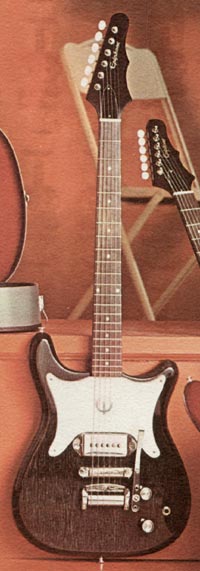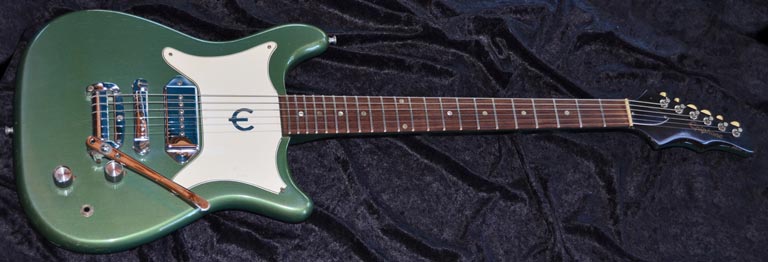
 This Cherry-finished Coronet has the symmetrical body and headstock, characteristic of the early 1960s
This Cherry-finished Coronet has the symmetrical body and headstock, characteristic of the early 1960s
 Epiphone Coronet in Silver Fox finish - image taken from the 1966 Epiphone catalogue
Epiphone Coronet in Silver Fox finish - image taken from the 1966 Epiphone catalogue
The Epiphone solid-body range was first conceived after the Stathopoulos-era, once production had been moved to Kalamazoo under the auspices of CMI/Gibson. Along with the Crestwood, the Epiphone Coronet was the first of the new solid body models, debuting in 1959; two years after the aquisition.
Many of the early Gibson-built Epiphones used up old pre-1957 parts; the example pictured in the 1961 and 1962 catalogues is shown with 1950s Epiphone 'New York' pickup, however older examples also had the Epiphone metal 'V' style logo plate and original Epiphone control knobs.
Like many Epiphone guitars of the period, it could be directly correlated to a Gibson equivalent model. The Coronet was broadly equivalent to the Gibson Les Paul Junior and, despite preceding them by some years, the SG Junior; sharing many features; hardware, pickup configurations, body and neck woods, construction and controls. They were all made at Gibson's Kalamazoo factory, so this is not surprising. In the 1/10/66 pricelist the Coronet was actually more expensive than the Gibson equivalent, $179.50 to $169.50 for the SG Junior.
In the 1960s a number of cherry-finished Coronets were ordered by the Dwight music store in America (111 in 1963 and 67), with a Dwight logo on the headstock, and a D instead of an E on the scratchplate. One of these guitars was most famously used by Steve Marriott of the Small Faces / Humble Pie.
The Coronet (along with the other guitars and basses in Epiphone's solid body range) was restyled in late 1963: functionally it was the same, with identical construction, woods, controls, scale and number of frets, but the symmetrical body was replaced with a slightly modified version with smaller lower horn. The total body dimensions did not change but the new batwing headstock gave the guitar a slightly greater overall length. This new headstock had single sided tuning keys. The P90 pickup cover was upgraded from black plastic to metal; nickel-plated at first, but chrome by 1965. The dogear style remained the same however.
The Coronet shipped right through until 1969, when Epiphone production ceased in the USA. A total of 4414 Coronets were shipped, with 1964 the strongest year with 1061 guitars leaving Kalamazoo.
The stunning 1965 Epiphone Coronet (below) has all the post '63 redesign features: non-symmetrical body, batwing single-sided headstock and chrome plated hardware - including P90 pickup cover. Note also the Epiphone amp-style control knobs. This very rare guitar was one of very few (precise number unknown) Coronets produced in Epiphones Pacific Blue finish. Pictures courtesy Michel Giallombardo at Dayton Vintage Guitars.

1961 'guitars, basses, amplifiers' catalogue
“Strictly modern and strictly wonderful. A new thinner double cutaway, solid body guitar in cherry red finish.”
1962 'guitars, basses, amplifiers' catalogue
“The Coronet features a powerful and sensitive single pickup located for clarity of tonal response... with separate tone and volume controls for easy adjustment.”
1964 full line catalogue
This is the first catalogue to show the new-style asymmetrical Coronet, with six-a-side tuners
1966 full line catalogue
“Epiphone is proud to present solid body instruments that offer the depth, the sharp treble, the biting tone and the virility that all guitarists seek from a solid body instrument”
The Epiphone Coronet was listed as available in Cherry finish throughout it's production period, and Silver Fox in 1963-65. Shipping stats do not give any clue as to the numbers of Silver Fox guitars unfortunately. One important caveat with these figures: from mid 1965, the Maestro vibrato became standard on the Coronet, and the SB533MV model designation was dropped. So technically all SB533 guitars beyond 1966 had the vibrato, though, as is always the case, exceptions probably exist.
| 1959 | 1960 | 1961 | 1962 | 1963 | 1964 | 1965 | 1966 | 1967 | 1968 | 1969 | total | |
| SB533 | 237 | 221 | 462 | 499 | 368 | 685 | 337 | 386 | 140 | 34 | 4 | 3373 |
| SB533MV | 7 | 54 | 124 | 376 | 480 | 1041 | ||||||
| Dwight | 75 | 36 | 111 |
In the 1970s the Epiphone (now Japanese manufactured) launched a new guitar dubbed Coronet, however with a model number ET275. This was a double pickup instrument with a similar body shape, but a bolt-on neck, and very different hardware.
$8999
$375
$5000
$3695
$1699